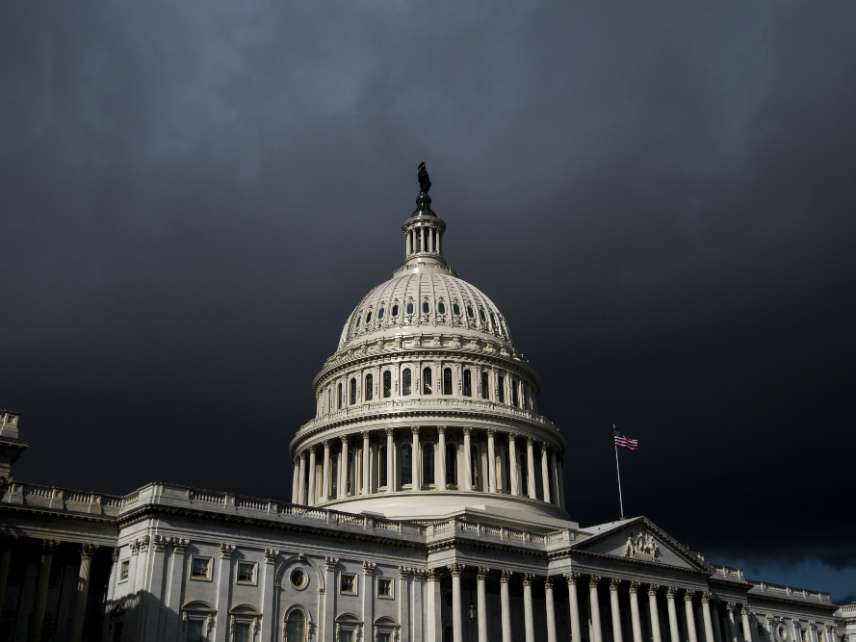Making the Federal Government Lean Again
With trillion-dollar deficits on the horizon, now is the time to start talking about government austerity.

We are not in a full-scale war. We are not in a recession or fighting a high unemployment rate. But the federal government is spending as if we were a teenager with a parent's credit card. Trillion-dollar deficits are coming back soon, so this is the perfect moment to start talking about government austerity.
According to the Congressional Budget Office, even before taking under consideration the budget impact of the Tax Cuts and Jobs Act and the added spending from the budget deals, we are about three years away from the next $1 trillion deficit. Also, this year, the Department of the Treasury will inevitably have to borrow hundreds of billions of dollars to pile on top of our already eye-popping $20.6 trillion of gross debt, which is public debt plus the debt the federal government owes to other accounts, such as Social Security. That's over 100 percent of our gross domestic product. It will also have to request yet another increase to its borrowing limit.
Strikingly, President Donald Trump made zero mention of the debt or the growing deficits during his State of the Union address. However, he didn't fail to ask for new spending on infrastructure, another job training program to be added to the dozens of existing and inefficient ones, immigration enforcement, and a wall on the southern border. And he asked for more defense spending than he is currently allowed to have.
There was no mention of how we would pay for all of that stuff, and he even mentioned more tax cuts. (Obamacare taxes, I am looking at you.) For those reasons, it's high time to ask that this administration and Congress make the federal budget lean again.
At this point, many of you may think I am delusional. Indeed, a look at budget numbers reveals that when Republicans are in control of Congress and the White House, special interests that feed at the teat of government have nothing to fear. Government continues to grow. You get some tax cuts and a few military operations but no spending cuts or reforms to the entitlement state. In fact, you may get a new entitlement program, such as Medicare Part D or paid family leave.
Nonetheless, it is worth trying to fight for fiscal responsibility by reminding elected officials that debt and deficits aren't good. They're expensive. They slow the economy over time. They make it more difficult to respond to true emergencies. And they make it likelier that tax cuts will be undone in the future. They are also unfair to the future generations that will pay for them with lower growth, fewer jobs and higher taxes.
The great news is that if lawmakers decided to do the right thing, we would know what to do. There is not only a large amount of literature but also a consensus among economists about what fiscal adjustment packages are the most effective at reducing the debt-to-GDP ratio with the lowest level of short-term costs.
First, based on past experiences in developing countries, we know that spending-based adjustments are more successful than tax-based adjustments at reducing the debt-to-GDP ratio. They also last longer.
Second, consolidations based on spending cuts are more effective if they focus on reforming entitlement programs. Spending-based adjustments, unlike tax-based ones, also lead to long-term growth.
Third, spending-based packages can sometimes encourage economic growth in the short term. Tax-based ones never do. Even the International Monetary Fund recognizes in its research that when spending-based adjustments impose a short-term slowdown, the declines in consumption and GDP are three or four times smaller than tax-based fiscal consolidations. These findings were confirmed in a recent paper by Harvard economist Alberto Alesina and his co-authors.
Now, the more depressing part of this body of research is that a vast majority of the fiscal adjustment experiences end up as failures because politicians choose to raise taxes rather than cut spending. Maybe that's because they continue to be more committed to the special interests benefiting from the government programs—e.g., seniors—than to the long-term health of their country.
Whom are American politicians loyal to? Let's hope they decide to pick fiscal sustainability over special interests.


Show Comments (37)